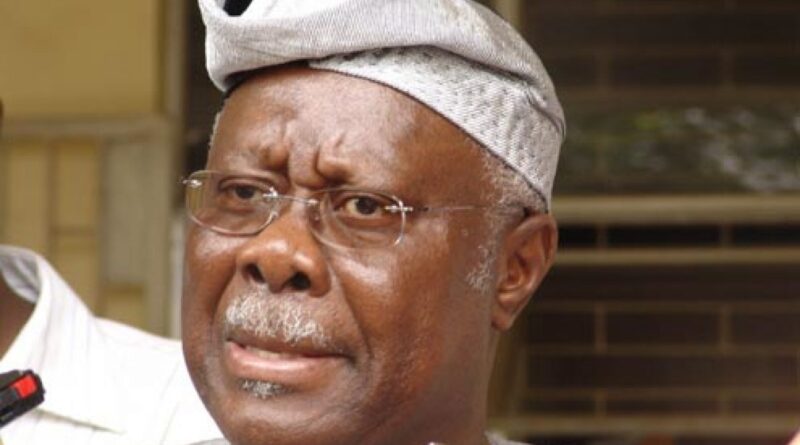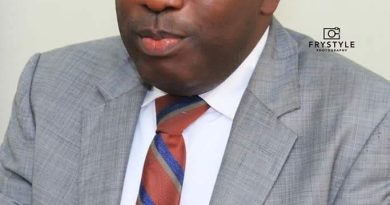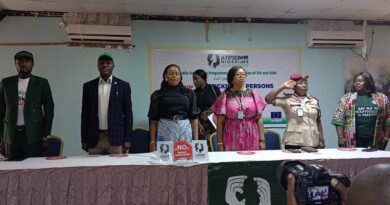‘When Nigerians No Longer Trust Judiciary, Anarchy Looms’, Lagos PDP Elders Warn
The People’s Democratic Party’s elders in Lagos state have warned of the dire consequences if Nigerians no longer trust the judiciary to dispense justice.
Briefing journalists after its caucus meeting in Lagos on Monday, former Deputy National Chairman of the People’s Democratic Party, Chief Olabode George, said the belief of many Nigerians in the judiciary is shaken because of the conflicting and contradictory judgements coming out of our courts.
Flanked by former deputy governor of Lagos state, Mrs Kofoworola Buknor-Akerele and former PDP women’s leader, Chief (Mrs) Onikepo Oshodi and other PDP elders, George maintained that these are not the best of times for the judiciary in Nigeria.
According to him, what is oozing from the third arm of government in the world’s most populous black nation is offensive to millions of Nigerians.
“And when the judiciary is compromised, one way or the other, in a democratic system, then democracy is gone.
“Many Nigerians believe that members of the Executive and Legislature are already living in a different planet. So, they see the Judiciary as the last ‘Estate’ standing in the ‘Realm’.
“In Nigeria, there are hundreds of judges upholding the sanctity of the judiciary. They not only give judgements but they deliver justice. Nigerians still believe in them.But, because of conflicting and contradictory judgements coming from a few, the belief of many Nigerians in the judiciary is understandably shaken. This is worrisome because if the people don’t believe in the Third Arm of Government anymore, anarchy looms.
“Today, many Nigerians point to some corrupt judges who escape unscathed to enjoy their ill-gotten wealthbecause the system is weak or compromised to do proper investigation.We now have a situation in which courageous judges who refuse to do the biddings of ‘powers that be’ are accused of being corrupt and forced to resign. What an irony! In many political cases, millions of people believe, and rightly so, that some judges deliver judgements, NOT justice.”
Going down the memory lane, George said: “Eminent Nigerians knew the judicial and justice system in the country during the days of former Chief Justices of Nigeria, such as Justice Stafford Foster Sutton (1955 – 1958), Justice Adetokunbo Ademola (1958 – 1972), Justice Teslim Olawale Elias (1972 – 1975), Justice Darnley Arthur Alexander (1975 – 1979), Justice Atanda Fatai Williams (1979 – 1983), Justice Gabriel Ayo Irikefe (1985 – 1987) and Justice Muhammed Bello (1987 – 1995), the first Northerner to become Chief Justice of Nigeria.What of Justice Chukwudifu Oputa and Justice Kayode Eso?”
Continuing, he said; “these are legal giants who stand their grounds against any form of victimisation or unnecessary manoeuvre from the executive branch of government.You dared not look at their faces or even try to bribe them.
“So, the questions being asked today are, among others,: ‘What exactly is the problem of the judiciary? Where did we get it wrong? Why is it difficult for the judiciary to assert its control over politicians and political parties? Why are technicalities being used to affirm electoral heists and, in the process, undermine the will of the people and silence them?
“What is the meaning of a ‘typographical error’ when a judgement had already been delivered? Is it, according to some Nigerians, that the ‘real’ judgement was pushed aside and another read which has now led to a ‘typographical error’? In justice delivery and matter of life and death, judges are next to God. That is why anything that comes from the court is final, especially from the apex court in the land – the Supreme Court.
“There is nowhere to go again after the Supreme Court says YES or NO on a matter before it. It is the final bus stop.So, any pronouncement from our courts must be infallible. But, when people begin to question the judgement of a particular court, it shows that there is a crisis in the polity.
“This is totally unacceptable in Nigeria of 2023.The judiciary, recently, and to the embarrassment of millions of Nigerians, has not lived above board. There are many conflicting judgements from courts of coordinate jurisdiction that Nigerians begin to wonder:What exactly is going on?
“There was this popular saying from the 1950s to 1980s in Yorubaland ‘orun ke niwaju Adajo’ (you dare not sleep before a judge).Those were the glorious years in Nigerian judiciary when judges were judges, but what do we have today?”
The highly respected Justice Niki Tobi once said: “a Judge by the nature of his position and professional calling, is expected to be straight forward, upright, diligent, consistent and open in whatever he does in court and in other places of human endeavour that he happens to find himself. This is because his character as a judge is public property.
”What do we have in the country today? Some courts constantly come to the rescue of selected political elite, either in political or criminal cases.”
Speaking at the International Bar Association (IBA) conference in Paris, France, recently, former President of the Nigerian Bar Association (NBA), Mr Olumide Akpata, lamented that only by sheer luck will the Nigerian judiciary produce a good judge.
In his lamentations, he said: “The country is under judiciary capture. When I was a statutory member of the National Judicial Council (NJC) (the body saddled with the responsibilities of recruiting and disciplining erring judges in Nigeria), I found out that politicians were desperate to pocket the judiciary. It is deliberate, and it is intentional. And it is achieving results for them.
“Embarrassingly, there are now incessant conflicting ex-parte orders from courts of coordinate jurisdiction.Many Nigerians see this as a cankerworm affecting the judiciary. Stories of millions of dollars now fly around, especially in political cases. Sadly, some politicians now use the court as a shield, and the highest political bidders are recklessly granted favourable orders.
“A few weeks ago, retired Justice of the Supreme Court, Musa Muhammad Dattijo, took the judiciary to the cleaners. Nobody could have exposed the rot in the third arm of government better than the septuagenarian jurist. What a shame! Obviously, the unholy dalliances between some politicians and judges is dangerous to our democracy.
“Millions of people will come out on the day of election, queue, collect ballot papers, cast their votes for their preferred candidates, results will be announced and everybody will jubilate only for three, five or seven judges to upturn the popular will of the people. What an affront?Pitiably, we now have a situation in which politicians who did not participate in party primaries are affirmed by the judiciary as the candidates because of ‘technicalities’.
“That is why Nigerians strongly believe that some members of the Executive suppress and intimidate Judges, just to get favourable judgements. Electoral verdict should be the sole responsibility of the electorate but it has now been turned upside down. It is now “government of the judiciary, by the judiciary, for the judiciary”.
“Democracy should be about the people, exercising their fundamental human rights, not being goaded, as we are presently witnessing.
“Now, Judges select who should be members of House of Representatives, Senators, Governors and even the President. What kind of electoral system are we running that all vices, electoral crimes, defects and manipulations cannot be checked before the general elections?
“Look at Liberia. Even when the electoral commission was still counting the votes, George Weah had already congratulated his challenger, Joseph Boakai. Goodluck Jonathan did same in Nigeria in 2015.
“It is our belief that the best the judiciary must do in political cases is to adjudicate and where there are discrepancies, order for a rerun without giving victory to party A or B.
“In our opinion, it is wrong to remove the power of the electorate to elect political leaders and for the Judiciary to tell us who the winners are.
“This is not good for the polity. This is not good for Nigeria. This is not good for our electoral system. A compromised judiciary is dangerous. Something urgent must be done to stop this malady.”




